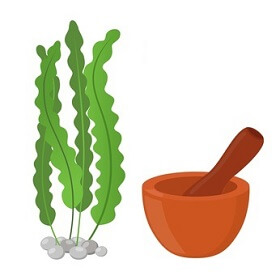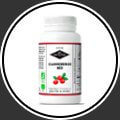Main properties and uses of spirulina
Spirulina is a blue-green micro-algae offering an exceptional nutritional composition in iron, antioxidants, B vitamins, vitamin E, beta-carotene, phosphorus, copper, zinc, calcium, etc. This composition combined with its very high protein content makes it a food supplement of choice for athletes: it is an excellent tonic which protects against physical and intellectual fatigue and promotes recovery.
Main uses of spirulina:
- Immune strengthening:

- Strengthening and physical recovery:

- Asthenia, physical and intellectual fatigue:

Different forms of use of spirulina:
Spirulina can be consumed in different forms:
- Although the capsule remains the most practical form, spirulina is available in other forms.
- Powder: mixed with water, 2x/day.
- No external use

Spirulina ID card
- Botanical name:
Spirulina platensis - Synonyms:
blue-green algae
- Family :
pseudanabaenaceae - Part used:
whole seaweed
- Harvest time:
all year - Geographic origin :
India
-
Spirulina as a physical tonic (ideal for improving sports performance):
One of the particularities of spirulina is its incredible composition rich in vitamins, minerals and trace elements. It would thus have a beneficial effect on people suffering from physical and/or intellectual fatigue. It is one of the foods in which we find the most protein (60 to 70% while the egg contains only 12% and meat or fish, 20%). It contains large amounts of iron, it is also an important source of magnesium and vitamins B1 and B2. This exceptional composition makes it an algae that can be of great help to tired people. Likewise, it is ideal for improving sports performance (bodybuilding, endurance, recovery, muscle oxygenation).
-
Spirulina as an immunostimulant:
The immune system is the best ally in defending itself against infectious diseases. It allows us to hunt viruses, fight bacteria, attack fungi and fight parasites. Immunity is therefore what allows living beings to survive by defending themselves against foreign substances and infectious agents. The stimulating effect of spirulina on the immune system has been demonstrated by several teams of researchers. Given the composition of this algae, the results were to be expected. Indeed, it contains antioxidant molecules, B group vitamins, vitamin E, selenium, zinc, trace elements as well as γ-linolenic acid. These components have already shown, individually, their immunostimulating effect. What's more, this is not the only element that justifies this powerful toning effect of spirulina on the immune system. This would also be due to the presence of complex molecules, polypeptides (phycocyanin) and polysaccharides (calcium-spirulan). Spirulina would thus have a positive effect on the organs participating in the development of the immune system and it would stimulate the functioning of immune cells. Consuming a spirulina extract could therefore be beneficial for people suffering from a weak immune system, whether temporary or permanent.

The most interesting synergies based on spirulina
In order to optimize the effects of spirulina, it is possible, or even recommended, to combine it with other plants, essential oils or natural active ingredients. Here you will find some advice depending on the problem concerned:-
Immune system :

Plants: Plants: Echinacea ginseng, garlic
Essential oils: Essential oils: Ravintsara, Lemon, Palmarosa, tea tree
Other active ingredients: Other active ingredients: Propolis or royal jelly -
Physical and intellectual fatigue:

Plants: Plants: green tea, maca, guarana
Essential oils: Essential oils: peppermint, ravintsara, black spruce
Other active ingredients: Other active ingredients: magnesium, grapefruit seed extract, royal jelly
Precautions for use and contraindications of spirulina:
This information is not exhaustive!! Always also consult the instructions on the product packaging as well as the manufacturer's recommendations. If in doubt, consult a health professional.
Spirulina itself does not appear to present any risks, although the manufacturing quality of some dietary supplements may be questioned.
- Spirulina is contraindicated for people with an allergy to algae.
- If you are prone to gout, urinary stones, or have high blood uric acid levels, exercise caution.
- This algae is also not recommended for people who suffer from phenylketonuria, a rare genetic disease.
- Not recommended if taking anticoagulants concomitantly
- Keep out of reach of young children. Use reserved for adults.
- Not recommended for children, pregnant or breastfeeding women.
- This product cannot replace a varied diet and a healthy lifestyle. Do not exceed the recommended daily dose.
Interactions to consider with spirulina:
Spirulina, by acting on liver enzymes called cytochromes P450 which metabolize drugs, could increase the risk of adverse effects from molecules metabolized by these same enzymes.
There are no known interactions of spirulina with supplements or herbal remedies. It can be used alternately with chlorella in order to detoxify the body.

There is a very large body of scientific research on the therapeutic potential of spirulina and it would be difficult to cover them all. Here is our selection:
Spirulina and HIV
HIV (human immunodeficiency virus) is a retrovirus responsible for AIDS (acquired immunodeficiency syndrome) which corresponds to a weakening of the immune system which then becomes vulnerable to numerous infections. HIV contamination is nowadays considered a pandemic (= global epidemic). It caused the death of approximately 25 million people between 1981 and 2006.
WARNING: Spirulina will never replace triple therapy and any antiretroviral treatment must be supervised by a doctor!
All the drugs and triple therapies on the market stop the progression of the disease and allow patients to live, with the virus, asymptomatically. Many of these triple therapies also prevent transmission of the virus between partners. They therefore constitute a major advance BUT A TREATMENT MUST BE TAKEN FOR A LIFE AND MUST NEVER BE STOPPED. Forgetting or stopping taking it, even minor (a few days) can have dramatic consequences on the resumption of the virus and the decline of the immune system. Antiretrovirals are therefore very effective but do not completely eradicate the virus; monitoring is necessary throughout life to allow the patient to live with their virus without feeling its effects. Any change in treatment due to side effects must be supervised by a doctor!
In 1998, a study was carried out with the aim of evaluating the effects of spirulina against human immunodeficiency virus type 1. It showed that a water-soluble extract of spirulina (Arthrospira platensis) had the effect to slow down HIV replication in several types of human cells. Viral replication in mononuclear cells was reduced by half using concentrations of spirulina extract between 0.3 and 1.2 µg/ml. What's more, researchers noticed that spirulina, when pre-incubated with HIV-1, managed to deactivate infection by the virus. This antiviral activity would originate from the polysaccharide fraction of spirulina which would thus have a very strong therapeutic potential.
A team of Japanese researchers conducted research aimed at determining the antiviral effect of calcium-spirulan (Ca-SP), a polysaccharide contained in spirulina. One of the studies showed that Ca-SP had an inhibitory activity on the penetration of certain viruses (including HIV-1) into host cells. Overall, the results of these studies suggest that calcium-spirulan has antiviral activity against HIV-1. It would be able to inhibit the replication of the virus, preventing it from binding to the host cell, thus stopping its fusion with the virus. This conclusion is very encouraging given that Ca-SP would have all the essential properties of an excellent antiviral agent. The challenge today remains to continue research by carrying out more in-depth studies, ultimately on large samples of the human population.
Another study carried out in Cameroon and published in 2011 demonstrated the nutritional effectiveness of spirulina in people with HIV and malnutrition. It also showed that spirulina extract helped reduce the viral load in these individuals. The authors of the study concluded that these results would prove that spirulina could become an adjunctive treatment for this type of patient. Numerous studies on the nutritional and therapeutic effects of spirulina are there to support this assertion. However, the virtues of spirulina are not yet fully recognized, particularly in countries in the southern hemisphere.
Large clinical trials are now needed to confirm the results of studies on spirulina which are currently accumulating exponentially. Support from inter-governmental associations and NGOs could play a decisive role in research into the effects of spirulina. Unfortunately, today only the Food and Agriculture Organization of the United Nations and a few countries recognize spirulina for its extraordinary potential.
Bibliography of this study: Inhibition of HIV-1 replication by an aqueous extract of Spirulina platensis (Arthrospira platensis). Ayehunie S, Assureur A, Baba TW, Ruprecht RM. J Acqurir Immune Defic Syndr Hum Retrovirol. 1998 Calcium spirulina, an inhibitor of enveloped virus replication, from a blue-green alga Spirulina platensis. Hayashi T, Hayashi K, Maeda M, Kojima I. J Nat Prod. 1996 From malnutrition to HIV: spirulina is an effective solution that continues to reveal its secrets. Raphaëlle Birot, Diane de Jouvencel et al. Women's and children's health. 2012 Spirulina: assessment and perspectives. Hélène Cruchot. 2008
Conclusion and professional opinion:
Spirulina is a natural product that has a very large number of virtues. It is recommended for athletes. Tired people will see an improvement thanks to the presence of iron which can also increase sports performance. It also has a toning effect on the immune system. Spirulina is also an excellent ally in detoxification. The results of the various studies that have evaluated its antiviral properties are more than encouraging, giving rise to new hope for people suffering from human immunodeficiency virus (HIV) type 1. However, more in-depth clinical trials are needed. to be able to determine its role with certainty.
Be careful to always check the origin of the spirulina since this algae can easily absorb heavy metals and pollutants found at the place of production.
The data summarized here is given for information purposes and cannot engage our responsibility.
For further information on use, instructions for use, precautions to take and uses advised against, please refer to the commercial data sheet and label of your products. The food supplements described here are natural plant-based products. However, they are not without danger and without possible interactions with other medications or treatments. It is therefore very important to respect the recommended doses and to tell your doctor or pharmacist that you are taking these products: only he or she will be able to determine if any interactions exist between the food supplement and another treatment or medication that you may be taking.
The pathologies cited in this article are illnesses that can be serious or even life-threatening. A visit to a doctor remains essential. Only he will be able to make a precise diagnosis and, if necessary, provide you with the most appropriate treatment.
Bibliography
- "Spirulina" http://examine.com
- Spirulina: blood system, immune system and cancer. C. Girardin-Andréani. Phytotherapy. 2005
- Role of spirulina in the control of glycemia and lipidemia in type 2 diabetes mellitus. Parikh P, Mani U, Iyer U. J Med Food. 2001
- Antioxidant activity of different fractions of the protein extract of Spirulina platensis. Piñero Estrada JE, Bermejo Bescós P, Villar del Fresno AM. Medicine 2001
- Purification and antioxidant activity of phycocyanin from Synechococcus sp. R42DM isolated from an industrially polluted site. Sonani RR, Patel S et al. Bioresource Technology. 2017
- The Incredible Properties of Phycocyanin. Thierry Schmitz. Principles of Health. 2014
- Spirulina: assessment and prospects. Hélène Cruchot. 2008
- Red cell magnesium and chronic fatigue syndrome. Cox IM, Campbell MJ, Dowson D. Lancet. 1991
- The Authoritative Guide to Grapefruit Seed Extract. Allan Sachs. 1997
- “Blue-green algae”. https://www.mskcc.org
- OPINION from the National Agency for Food, Environmental and Occupational Health Safety relating to “risks linked to the consumption of food supplements containing spirulina”. ANSES. 2017
- Inhibition of HIV-1 replication by an aqueous extract of Spirulina platensis (Arthrospira platensis). Ayehunie S, Assureur A, Baba TW, Ruprecht RM. J Acquire Immune Defic Syndr Hum Retrovirol. 1998
- Calcium spirulina, an inhibitor of enveloped virus replication, from a blue-green alga Spirulina platensis. Hayashi T, Hayashi K, Maeda M, Kojima I. J Nat Prod. 1996
- From malnutrition to HIV: spirulina is an effective solution that continues to reveal its secrets. Raphaëlle Birot, Diane de Jouvencel et al. Women's and children's health. 2012
NOTE: This article was written by a pharmacist. The data summarized there come from the scientific literature and the references cited above. For medical advice, in the event of specific or prolonged symptoms, please consult your doctor. Only he will be able to make a precise diagnosis and provide you, if necessary, with the most appropriate treatment.
 OUR
OUR